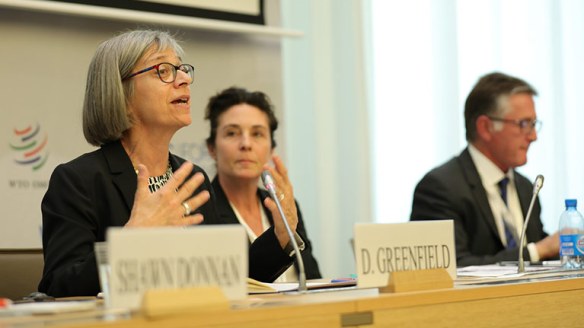
Thoralf Stenvold
Special Project Officer, ILO Department of Multilateral Cooperation
The World Trade Organization’s Public Forum is the WTO’s annual gathering for policymakers, academics, civil society and anyone with an interest or a stake in global trade and trade policy. This year’s forum, held at WTO headquarters in Geneva 26-28 September, was all about jobs, reflected also in the World Trade Report launched there, entitled “Trade, Technology and Jobs”. The ILO played an active role, speaking at five panels, including two by Deputy Director General Deborah Greenfield.
The forum’s title this year was “Trade: Behind the Headlines”, reflecting the increasing recognition of the fact that many people around the world feel that globalization and the international trading system are not serving their interests. The purpose was to dig deeper and look at what needs to be done to meet these challenges.
Not surprisingly, the World of Work was central to the discussions in most of the 105 events, including the opening plenary, which was moderated by WTO Director-General Roberto Azevêdo, with IMF Managing Director Christine Lagarde, Nobel laureate economist Paul Krugman and former foreign minister of Argentina Susana Malcorra among the participants.
“We have drastically underestimated people’s concern[s] with the pace of change in the globalized economy. How can we make trade benefit more people?” Mr Azevêdo asked in his opening remarks. Many of the answers he received were highly relevant to the ILO.
“Invest more in education, skills and social institutions”, was Paul Krugman’s recommendation.

ILO Deputy Director-General Deborah Greenfield underscored the importance of social dialogue on a panel about the Global Deal, one of two she spoke at during the WTO’s annual gathering.
Christine Lagarde brought attention to recent trade agreements which include labour provisions, contributing to domestic redistribution of the benefits of trade.
Susana Malcorra, who will chair the WTO’s Ministerial Conference in Buenos Aires in December, referred to the 2030 Agenda and the SDGs as guidelines for trade policymakers. “We need to address disparities, and institutions are key.” She then told the over 2,000 participants that jobs and education will be Argentina’s key priorities when it takes over the G20 next year.
All of this set a perfect stage for the ILO to play an active role at this year’s forum. Deputy Director-General Deborah Greenfield spoke about the importance of social dialogue at an event on the Global Deal, organized by Sweden and the World Bank Group.
Deputy Director-General Greenfield also spoke at an event organized by the OECD, entitled “Making Trade Work for All”, which called for a more integrated approach to global economic cooperation, including the relationship between trade and labour. Here, Ms Greenfield explained workers’ concerns about globalization and discussed the ILO’s active engagement in trade-related issues, such as the International Labour Conference 2016 resolution on Decent Work in Global Supply Chains.
By quoting the resolution’s paragraph on trade, which calls on governments to “consider to include fundamental principles and rights at work in trade agreements, taking into account that violation of fundamental principles and rights at work cannot be invoked or otherwise used as a legitimate comparative advantage and that labour standards should not be used for protectionist purposes”, DDG Greenfield alerted the international trade community to the fact that the ILO, in its Social Justice Declaration of 2008, had addressed various dimensions of the trade and labour issue — 12 years after the WTO’s Singapore Declaration.
Another key message from this event was that social protection, social dialogue and redistribution policies are crucial to making sure that the benefits of trade are widely shared. The ILO’s Decent Work Agenda is of particular value in this regard.
The ILO’s broad engagement was also visible at an event organized by the International Trade Centre (ITC) and the Netherlands, entitled “Out of the Box: Innovative Partnerships for Inclusive Trade”, where Dan Rees, the director of Better Work, explained the programme and its success factors; how social dialogue and better working conditions have led not only to improved lives for workers, but also to more productive and profitable companies in garment sector supply chains. While highlighting this, he also pointed to important governance gaps which need to be addressed in order to enable and incentivize companies to apply the lessons learned and thus to scale up the application of the programme.
Trade and employment specialist David Cheong represented the ILO at a panel organized by CUTS International, a leading Indian think-tank, which focused on decent work in communities marginalized by trade and international competition. Mr Cheong made reference to the 2030 Agenda and the SDGs, in particular SDG 8, providing trade-related guidance to policymakers on the basis of the ILO’s Decent Work Agenda and the Social Justice Declaration. He called for inclusive consultations with all relevant stakeholders, including workers, in formulating trade policies, as well as careful examination of the specifics of trade agreements with regard to how they impact workers.
Finally, I myself spoke at a panel on “Refreshing the Work-Trade Relationship Guided by the SDGs”, organized by the Centre for International Governance Innovation (CIGI). My key message was on policy coherence among and within governments themselves. After all, the same governments which adopted the WTO Singapore Declaration—de facto separating the trade and labour regimes of global governance in 1996—came to revisit the issue 12 years later at the ILO, when adopting the Social Justice Declaration. The question, then, is if and when the same governments “take this message down to the lake” [WTO headquarters are on the banks of Lake Geneva], to make sure that violation of fundamental principles and rights at work no longer can serve as a legitimate and acceptable source of comparative and competitive advantage. To this effect, the 2030 Agenda and the SDGs should indeed serve as a guidance, reminding all of us, including trade policymakers, that trade is (only) a means to an end, while full employment and decent work for all are explicit goals of the highest order.
In addition to the five panel speakers, the ILO actively took part in more than a dozen events during the forum, where employment and decent work were at the centre of the conversation.
This year’s WTO Public Forum confirmed that the ILO and the World of Work are indeed central to the global conversation on trade policy and globalization. That being said, the leading actors are still approaching the nexus of trade and labour on the premise that challenges from globalized competition based on trade must be met at the national level only. Very few were prepared to discuss the inherent challenges from the lack of coherence in implementation and enforcement of different regimes of global governance, such as trade agreements and international labour standards.
One very important exception in this regard was the OECD, with its paper and event on “Making Trade Work for All”. With this in hand, and inspired by the general sentiment of the forum, time could now be ripe to achieve better policy coherence between trade and labour policies.
